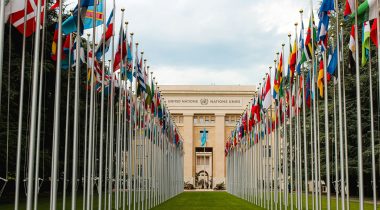
Telita Snyckers ■ Can the UN succeed? Top questions about our State of Tax Justice report

This week we released the 2023 edition of our flagship State of Tax Justice Report. It shows that countries are on course to lose US$4.8 trillion to tax havens over the next 10 years – that’s more than the entire world spends on public health annually; and argues that countries must adopt a UN tax convention to avert the astronomical losses.
“Isn’t tax avoidance legal?” “Has the OECD really failed – it’s agreed a global minimum tax rate?” “Can the UN succeed where the OECD hasn’t?” These are good questions folks have asked us about our new State of Tax Justice report. In our interview with @dwnews the Tax Justice Network’s CEO Alex Cobham talked about some of the answers:
“Isn’t tax avoidance legal?”
Because of the way that tax rules work – or rather the way that they don’t work – it’s actually impossible to draw a hard line between what’s illegal or unlawful avoidance and what’s lawful. So what we can see in the data is simply the scale of profit shifting – the amount of profits that multinational companies are artificially declaring in low tax (or no tax) jurisdictions instead of in the places where they’re actually making that money and where they carry out their real activity. We can’t say for sure in every case that they’re breaking the law to do that. We certainly can’t say that they’re not breaking the law. What we can say is that the impact is these huge losses of tax revenue that cost all of us in terms of foregone public services, in terms of our small businesses not being able to compete, not having a level playing field because they are paying their taxes and because of the inequality that we all suffer as result of not having these public services in place.
“Has the OECD really failed – it’s agreed a global minimum tax rate?”
The OECD has completely failed to deliver.
The OECD didn’t get an agreement on a minimum global tax rate in 2021 – except in principle. There was then and continues now to be no legally binding commitment.
Multinational companies should pay taxes the same as domestic companies should pay taxes: where they make their money, so where they have their staff, where they make their sales. Instead we’re stuck with a set of tax rules that the League of Nations agreed 100 years ago – and which the OECD has tried to defend. They rely on this pretense that the individual companies within a multinational group are actually trading with each other as if they were at arm’s length, as if they were independent companies. It’s not true and it’s wide open to abuse. That’s why we get these hundreds of billions of dollars in tax losses. We need to shift to a unitary tax system that allows us to tax companies in the places where they’re actually making money and really cuts through this profit shifting. But the OECD has failed to deliver that.
Unless there’s a dramatic shift in the US so the world is waiting on one country and can’t move forward with the minimum tax. Some jurisdictions have begun to introduce a piece of that but actually it’s the most aggressive corporate tax havens that are moving ahead like Switzerland – and that’s because they’ve worked out that this is so badly designed that they can actually do better under it. Meanwhile the degree of profit shifting will continue as before even if other countries sign up (which looks increasingly unlikely.) So we’ve had 10 years at least since 2013 of the OECD having the responsibility to deliver this and failing to do so.
There may possibly be a legally blinding instrument in place by the end of this year but it’s unlikely it will have any significant effect on revenue losses at all.
“Can the UN succeed where the OECD hasn’t?”
The United Nations has been designed to allow countries with conflicting interests on very complex questions to negotiate together. Because those negotiations are transparent people like us can hold our governments to account for the positions they’re taking. The problem at the OECD is they’re really not designed for this type of negotiation. All of the process are done in secret. That means you have governments coming out saying that they are firmly against corporate tax abuse – meanwhile in practice what they’re saying is no no we don’t want to make any progress at all, let’s block this.
Keeping things at the OECD pretty much guarantees that we will continue not making progress internationally but having this kind of zombie process continuing, preventing countries from taking unilateral measures that would be more effective themselves.
The UN promises more transparency, but also perhaps more hope of consensus. If you think about something like the UNF Triple C framework convention on climate change, there are cases where a big blocker (for example the United States) has been publicly shamed into having to take a better position. Because the negotiations are conducted in public, both the individual countries of the world can see what each other are doing, but so also can the citizens. So, when a country is taking a blocking position against measures that would be good for everyone – including itself – perhaps it’s doing so because of the corporate lobbying that it’s subject to. That’s something we see in tax justice as much as we see it in climate work. These countries can be forced by the transparency into taking a better position. That’s certainly what happened with the United States on climate. The expectation is that while tax negotiations at the OECD allow individual countries to play a very significant blocking role without any kind of accountability, in the United Nations that’s simply not possible. That doesn’t guarantee that every country will behave better or that we won’t have blockers. But it does guarantee that we’ll be able to see what’s happening.
The other big difference is that the OECD tries to achieve consensus privately, while the UN has an explicit mechanism for voting, so that on questions where you can’t reach consensus you can still move forward with a majority vote. That means an individual country – even a very big one like the United States – cannot block the rest of the world from moving forward.
The questions underscore the other arguments we have explored on why the world needs UN leadership on global tax policy: it is the single most representative global body; its specialist technical bodies and legal frameworks were designed precisely to coordinate and harmonise global practices; and it secures accountability through enforceable binding agreements and reporting mechanisms.
Related articles

The elephant in the room of business & human rights
The elephant in the room of business & human rights
UN submission: Tax justice and the financing of children’s right to education
14 July 2025

How the UN Model Tax Treaty shapes the UN Tax Convention behind the scenes
The 2025 update of the UN Model Tax Convention
9 July 2025
One-page policy briefs: ABC policy reforms and human rights in the UN tax convention

Bad Medicine: A Clear Prescription = tax transparency
Tax justice pays dividends – fair corporate taxation grows jobs, shrinks inequality
The millionaire exodus myth
10 June 2025



How can a world leader manage to REALLY make a good change in national taxation policies? Every government in power makes up its own rules about who and what to tax and more importantly who and what not to tax, too. The only way such a leader might have this ability is after the effect of climate heating and pollution and the resulting wars, droughts, disease, famines and the reduction in population, result in only one country and one religion being dominant and outvoting all the rest, after the world’s population has shrunk to less than half its existing one.